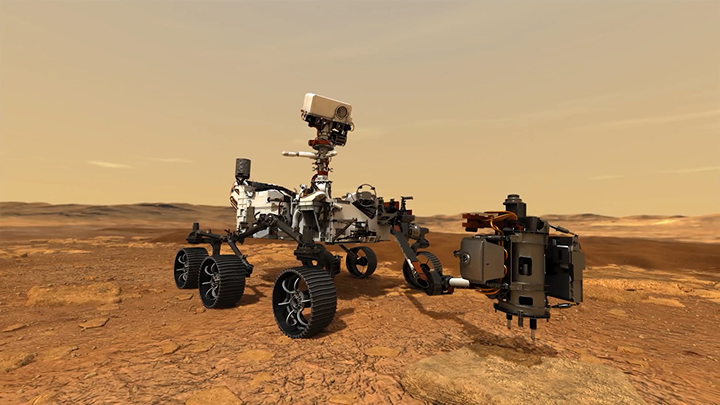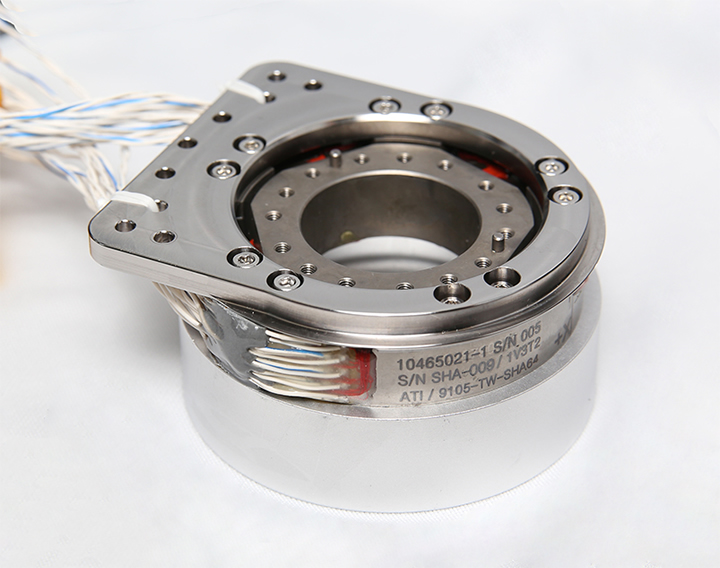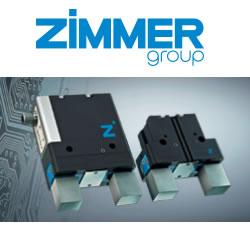ATI Develops Space-rate Force /Torque Sensor for Mars 2020 Rover

APEX, N.C. July 23, 2020 – ATI Industrial Automation worked with NASA’s Jet Propulsion Laboratories (JPL) to develop a custom Force/Torque Sensor for Perseverance, the latest Mars 2020 Rover project. JPL is the leading US research entity for robotic exploration of our solar system and manages NASA’s Deep Space Network, the hardest-working telecommunications system on the planet. The Mars 2020 mission is a collaborative effort undertaken by NASA, JPL, and many other organizations commissioned to develop new technology to explore the surface of Mars.
JPL needed an automated system for collecting and handling space material as well as moving it through the indexing process. To accomplish this, engineers developed the Adaptive Caching Assembly, an application that resembles a pick and place operation commonly found on a factory floor. Actually developing the systems and components that would perform in the Rover mission was a huge challenge to overcome.
The Sample Caching Subsystem consists of the Adaptive Caching Assembly, a large robotic arm with a drill and an assortment of drill bits used to collect samples from designated areas on the surface of Mars. Once collected, a small robotic arm, known as the Sample Handling Assembly or SHA, inspects and seals the samples in the rover’s on-board laboratory.
An ATI Force/Torque (F/T) sensor integrated within the SHA end effector assembly provides enhanced responsiveness. With force sensing from ATI, the SHA is equipped to maneuver easily through the tight workspace, performing demanding tasks with acute accuracy.
To deliver a robust force sensing solution for the Perseverance project, ATI adapted their Force/Torque Sensor technology to offset the wide range of environmental conditions. The Space-Rated Force/Torque Sensor from ATI boasts a new design that provides signal redundancy and compensates for temperature variation, ensuring accurate resolution of forces and torques throughout the mission. This sensor is thermally calibrated and proven to operate optimally in a spectrum of extreme temperatures. To develop and test these breakthrough features, the ATI engineering team designed specialized calibration equipment and conducted 24-hour surveillance of product trials.
Components made of thermally-stable, low-outgassing materials were added to fortify the sensor against the drastic environmental fluctuations. These materials also prevent cross-contamination of samples during the mission, which is one of the most important considerations of the Mars 2020 Rover project.
After years of development, the highly anticipated Mars 2020 Rover is fully assembled and ready to begin its mission. Perseverance is set to launch on July 30, 2020 from Cape Canaveral, Florida and will arrive at Mars in February of 2021.
More on Mars 2020
The purpose of this particular mission, part of NASA’s Mars Exploration Program, is to learn about the red planet from firsthand experience. This project has a full agenda that includes searching for signs of ancient microbial life, categorizing the climate and geology of Mars to help determine the existence of inhabitable conditions, recovering samples from the planet’s surface, and, arguably the most exciting objective of this mission, preparing for human exploration of Mars.
The Perseverance Rover is an unmanned robotic vehicle about the size of a car; during its exploration, it will collect and index small samples of rock and soil from prime locations. Once on-board, sample tubes are cached inside the Rover for eventual return to earth.
This subsystem emulates automated processes found in the agriculture and manufacturing industries, where robots are used to make repetitive operations more precise. Certain application settings such as foundries and refineries require unusual environmental considerations for which ATI has developed specialized sensors. However, nothing quite compares to the conditions expected from the Mars 2020 mission; where subzero surface temperatures and rugged terrain are typical. Before landing on Mars, the rover and its subsystems have to survive the initial Atlas 5 rocket launch.
Beyond outer space applications, ATI’s Space-Rated Force/Torque sensor provides active force control for applications where repair opportunities are limited or in situations with high vacuum or extreme temperature variability.
Through this project, ATI developed new technology that will be a part of NASA history and provide robust and reliable force sensing to applications here on earth. The temperature compensation, thermally-stable components, and additional signal redundancy benefit users in industries such as radioactive decommissioning, oil and gas, metal casting and foundries, and other applications where conditions dictate continuous use in extreme environments. ATI looks forward to following Perseverance, the Mars 2020 Rover during its mission and to the innovative new applications that will feature this Space-Rated Force/Torque sensor.
View more about Perseverance, the Mars 2020 Rover Mission

More on ATI Industrial Automation
ATI’s Force/Torque sensors are often used with robots in these types of applications to enable greater process control and provide process verification, such as indicating that a pin is inserted properly into a fixture.
Beyond outer space applications, ATI’s Space-Rated Force/Torque sensor provides active force control for applications where repair opportunities are limited or in situations with high vacuum or extreme temperature variability.
Through this project, ATI developed new technology that will be a part of NASA history and provide robust and reliable force sensing to applications here on earth. The temperature compensation, thermally-stable components, and additional signal redundancy benefit users in industries such as radioactive decommissioning, oil and gas, metal casting and foundries, and other applications where conditions dictate continuous use in extreme environments. ATI looks forward to following Perseverance, the Mars 2020 Rover during its mission and to the innovative new applications that will feature this Space-Rated Force/Torque sensor.
Click here to learn more about ATI's Force/Torque Sensors
----------------------------------------------------------------------------------------------------------------------------
About ATI Industrial Automation
ATI Industrial Automation is the world’s leading engineering-based developer of robotic accessories and robot arm tooling including Robotic Tool Changers, Multi-Axis Force/Torque Sensing Systems, Utility Couplers, Manual Tool Changers, Robotic Deburring Tools, Robotic Collision Sensors and Compliance Devices. Their robotic end-effector products are found in thousands of applications around the world. Manufactured entirely in the USA, ATI products enable customers to achieve a high level of flexibility in robotic automation. Their flagship product is the Robotic Tool Changer, a robotic wrist coupling that locks and unlocks automatically, allowing a single robot to perform many different tasks. ATI products can be found at some of the world’s most renowned corporations and organizations including NASA, Ford, Honda and Johns Hopkins University. For more information visit ATI at: www.ati-ia.com.
Featured Product

